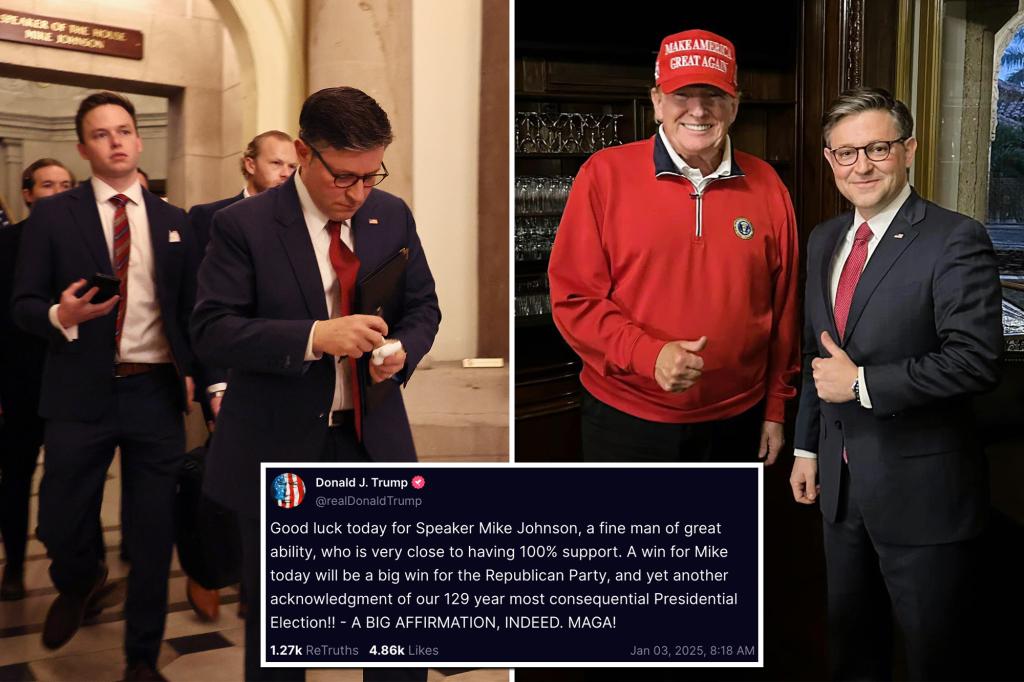The political landscape in the House of Representatives was fraught with tension as the re-election of Speaker Mike Johnson approached. President-elect Donald Trump, a significant force within the Republican party, threw his weight behind Johnson, publicly endorsing him on his social media platform, Truth Social. Trump framed Johnson’s potential victory as a triumph not just for the individual but for the Republican party as a whole, linking it to his own contested election victory. This endorsement added another layer of complexity to an already precarious situation, given the razor-thin Republican majority in the House and the internal divisions that had plagued the party in recent months. Johnson, acknowledging Trump’s support, echoed the call for unity within the Republican ranks, emphasizing the importance of delivering on the “America First” agenda, a key tenet of Trump’s political platform. This exchange underscored the significant influence Trump continued to wield over the party and the pressure on Johnson to maintain that support while navigating the challenging political terrain.
The speakership election was poised to be a nail-biting affair due to the extremely narrow Republican majority. With only a handful of votes separating the two parties, Johnson could afford to lose the support of just a single Republican member. This precarious balance of power made the opposition of Representative Thomas Massie, a known maverick within the Republican caucus, particularly significant. Massie publicly denounced Johnson, accusing him of betraying Republican principles and collaborating with Democrats. He urged his colleagues to reject Johnson and seek a more suitable candidate, highlighting the deep divisions within the party that threatened to derail Johnson’s bid for re-election. Several other Republican representatives remained undecided, further amplifying the uncertainty surrounding the vote. The lack of a clear alternative candidate, however, presented a significant obstacle to Massie’s efforts to unseat Johnson.
The backdrop of the speakership contest was the tumultuous removal of Kevin McCarthy from the speakership just months prior, a historic event that exposed the deep fissures within the Republican party. McCarthy’s ouster marked the first time a Speaker of the House had been removed by their own party, highlighting the unprecedented level of internal discord. The subsequent struggle to find a successor further exacerbated these divisions, with several prominent Republicans, including Jim Jordan, failing to garner sufficient support. Johnson’s eventual election to the speakership in October 2023, following weeks of intense infighting, was seen as a temporary truce rather than a lasting solution. This history of internal conflict loomed large over the upcoming re-election vote, adding to the pressure on Johnson to secure a decisive victory.
Despite the challenges, Johnson projected an air of confidence, predicting a first-round victory and emphasizing the need for party unity. He acknowledged the historically slim majority and the difficulties it presented, particularly in the crucial first 100 days of the Congressional session. The shrinking Republican majority, a result of resignations and appointments to the Trump administration, further complicated the political calculus. The magic number of 218 votes required to secure the speakership became even more critical given the reduced number of representatives. The possibility of absences or “present” votes added another layer of unpredictability to the proceedings, making the outcome even more uncertain.
Trump’s unwavering support for Johnson served as a crucial factor in the lead-up to the vote. The two met at Mar-a-Lago on New Year’s Day, further solidifying their alliance and discussing strategy for the upcoming speaker race. This meeting underscored the close relationship between Trump and Johnson, a relationship cultivated over time through joint appearances at rallies and other high-profile events. Trump’s endorsement, coupled with his active involvement in strategizing for the vote, demonstrated his continued influence within the Republican party and his determination to ensure Johnson’s re-election. This high-level engagement from the incoming president further elevated the stakes of the speakership contest, transforming it into a symbolic battle for control of the party’s direction.
The looming vote on Johnson’s speakership was more than just a procedural matter; it represented a critical juncture for the Republican party. The outcome would not only determine the leadership of the House but also serve as a barometer of the party’s unity and its ability to govern effectively with such a slim majority. The challenges facing Johnson – the narrow margin, internal opposition, and the legacy of McCarthy’s removal – highlighted the deep divisions within the party and the precarious nature of his position. Trump’s strong endorsement underscored the importance of the vote for the future of the Republican party and its alignment with the “America First” agenda. The uncertainty surrounding the vote created a tense atmosphere, with the potential for a protracted and divisive battle looming large. The outcome would have significant implications not only for the House of Representatives but also for the broader political landscape as the new Trump administration prepared to take office.

